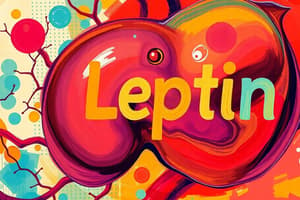Podcast
Questions and Answers
What is the primary role of leptin in the body?
What is the primary role of leptin in the body?
- To signal adequate energy reserves
- To control appetite and energy expenditure (correct)
- To increase food intake
- To stimulate insulin production
How does leptin levels change during fasting or low-calorie diets?
How does leptin levels change during fasting or low-calorie diets?
- Leptin levels decline (correct)
- Leptin levels fluctuate unpredictably
- Leptin levels increase significantly
- Leptin levels remain constant
What is leptin resistance suspected to lead to?
What is leptin resistance suspected to lead to?
- Reduced fat accumulation
- Enhanced leptin receptor sensitivity
- Increased energy expenditure
- Inadequate appetite control (correct)
What is the effect of high circulating levels of leptin in obese individuals?
What is the effect of high circulating levels of leptin in obese individuals?
What happens to soluble leptin receptors in obesity?
What happens to soluble leptin receptors in obesity?
Where are leptin receptors NOT found?
Where are leptin receptors NOT found?
What physiological adaptations occur due to low leptin levels?
What physiological adaptations occur due to low leptin levels?
What role does leptin play in relation to the CNS?
What role does leptin play in relation to the CNS?
Which condition is correlated with declining levels of serum leptin?
Which condition is correlated with declining levels of serum leptin?
What does leptin resistance potentially challenge in terms of energy balance?
What does leptin resistance potentially challenge in terms of energy balance?
What is the primary role of leptin in metabolic regulation?
What is the primary role of leptin in metabolic regulation?
How does adiponectin affect insulin sensitivity?
How does adiponectin affect insulin sensitivity?
Which of the following effects of leptin is NOT mentioned?
Which of the following effects of leptin is NOT mentioned?
What happens to adiponectin levels with weight loss?
What happens to adiponectin levels with weight loss?
What does the dysfunction of the adipo-insular axis contribute to?
What does the dysfunction of the adipo-insular axis contribute to?
Which inflammatory cytokine is suppressed by adiponectin?
Which inflammatory cytokine is suppressed by adiponectin?
What potential effect does adiponectin have in cancer biology?
What potential effect does adiponectin have in cancer biology?
Leptin delivered into the brain has what effect on feeding behavior?
Leptin delivered into the brain has what effect on feeding behavior?
Which signaling pathway is NOT activated by adiponectin?
Which signaling pathway is NOT activated by adiponectin?
What is the relationship between insulin and leptin secretion?
What is the relationship between insulin and leptin secretion?
What physiological change occurs when leptin levels decline during fasting?
What physiological change occurs when leptin levels decline during fasting?
What is a characteristic of leptin resistance in obese individuals?
What is a characteristic of leptin resistance in obese individuals?
Leptin is specifically secreted by which type of cells?
Leptin is specifically secreted by which type of cells?
Which central nervous system area primarily interacts with leptin to regulate appetite?
Which central nervous system area primarily interacts with leptin to regulate appetite?
What happens to soluble leptin receptors in individuals with obesity?
What happens to soluble leptin receptors in individuals with obesity?
How does leptin contribute to obesity through its relationship with energy balance?
How does leptin contribute to obesity through its relationship with energy balance?
What is one of the functions of leptin receptors located in peripheral organs?
What is one of the functions of leptin receptors located in peripheral organs?
What results from increased adiposity in relation to serum leptin levels?
What results from increased adiposity in relation to serum leptin levels?
In what way does leptin impact energy expenditure?
In what way does leptin impact energy expenditure?
What effect does leptin have on glucagon synthesis and secretion?
What effect does leptin have on glucagon synthesis and secretion?
How does adiponectin influence insulin sensitivity?
How does adiponectin influence insulin sensitivity?
What primary mechanism does adiponectin use to improve insulin sensitivity?
What primary mechanism does adiponectin use to improve insulin sensitivity?
What happens to adiponectin levels with obesity?
What happens to adiponectin levels with obesity?
Leptin receptors are found in which of the following locations?
Leptin receptors are found in which of the following locations?
What role does leptin play in the regulation of feed behavior when delivered into the brain?
What role does leptin play in the regulation of feed behavior when delivered into the brain?
What is a potential consequence of hypoadiponectinemia?
What is a potential consequence of hypoadiponectinemia?
Which pathway is activated by adiponectin through its receptors?
Which pathway is activated by adiponectin through its receptors?
What effect does insulin have on leptin secretion from adipose tissue?
What effect does insulin have on leptin secretion from adipose tissue?
What major effect does adiponectin have on cardiovascular disease risk factors?
What major effect does adiponectin have on cardiovascular disease risk factors?
Flashcards are hidden until you start studying
Study Notes
Leptin
- Leptin: hormone secreted by white adipose tissue, crucial for regulating appetite and energy expenditure.
- Encoded by the ob gene (obesity gene).
- Derived from the Greek word "leptos" meaning "thin."
- Acts as a signal of adequate or inadequate food intake.
- Levels decrease during fasting, low-calorie dieting, or type 1 diabetes.
- Elevated levels during increased adiposity (fat storage).
- Leptin resistance in obesity: despite high leptin levels, individuals fail to reduce energy intake and elevate energy expenditure.
- Leptin receptors (SLR): contribute to leptin function, their levels decrease in obesity.
- Leptin resistance potentially caused by decreased transport across the blood-brain barrier and reduced activation of hypothalamic signaling.
- Leptin's role extends beyond the CNS: receptors found in liver, skeletal muscles, pancreatic beta cells, and even adipose cells, explaining its endocrine, autocrine, and paracrine roles.
- Impacts glucose and lipid metabolism: acts as an insulin-sensitizer, decreasing glucagon synthesis and secretion, increasing insulin hepatic extraction, and impacting lipogenesis and lipolysis.
- Inhibits insulin biosynthesis and secretion from pancreatic beta cells, forming a feedback loop with insulin.
- Dysfunction of this feedback loop contributes to hyperinsulinemia and type 2 diabetes.
Adiponectin
- Adiponectin: another adipocytokine influencing insulin sensitivity and atherogenesis.
- Acts via receptors AdipoR1 and AdipoR2, activating pathways like AMP-dependent kinase and PPAR-α.
- Lower levels in obesity are linked to insulin resistance, dyslipidemia, and atherosclerosis.
- Levels increase with weight loss, alongside improved insulin sensitivity.
- Suppresses inflammatory cytokines like TNF-alpha, modulates natural killer cell function, and improves dyslipidemia.
- Potential anti-tumor effects: inhibits leptin-induced tumor proliferation, reduces tumor aggressiveness and metastatic potential.
- Hypoadiponectinemia associated with various cancers, including breast, gastric, lung, and prostate.
- Improves insulin sensitivity by increasing fatty acid oxidation in skeletal muscle and inhibiting hepatic glucose production.
Leptin
- Leptin is a hormone produced by adipocytes (fat cells)
- Leptin is involved in regulating appetite and energy expenditure
- Leptin levels decrease during fasting, low-calorie dieting, or uncontrolled type 1 diabetes
- Leptin works by binding to receptors in the hypothalamus of the brain
- Leptin levels increase with increasing adiposity (fat storage)
- Leptin resistance is a major factor in the development of obesity
- Leptin receptors are found in peripheral organs, including the liver, skeletal muscles, pancreatic beta cells, and adipose cells
- Leptin is involved in glucose and lipid metabolism and is an insulin sensitizer
- Leptin inhibits insulin synthesis and secretion from pancreatic β-cells
Adiponectin
- Adiponectin is a hormone produced by adipocytes (fat cells)
- Adiponectin influences insulin sensitivity and atherogenesis
- Adiponectin levels are lower in obesity.
- Lower adiponectin levels are associated with insulin resistance, dyslipidemia, and atherosclerosis
- Adiponectin levels increase with weight loss
- Adiponectin may have anti-tumor effects
- Adiponectin inhibits leptin-induced tumor proliferation
- Adiponectin increases fatty acid oxidation in skeletal muscle and inhibits hepatic glucose production.
Studying That Suits You
Use AI to generate personalized quizzes and flashcards to suit your learning preferences.




